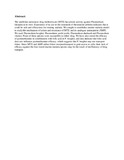| dc.contributor.author | Irungu, B | |
| dc.contributor.author | Kiboi, D | |
| dc.contributor.author | Langat, B | |
| dc.contributor.author | Rukunga, G | |
| dc.contributor.author | Wittlin, S | |
| dc.contributor.author | Nzila, A. | |
| dc.date.accessioned | 2013-06-27T12:49:53Z | |
| dc.date.available | 2013-06-27T12:49:53Z | |
| dc.date.issued | 2009 | |
| dc.identifier.citation | Irungu B, Kiboi D, Langat B, Rukunga G, Wittlin S, Nzila A.,Methotrexate and aminopterin lack in vivo antimalarial activity against murine malaria species.,Exp Parasitol. 2009 Oct;123(2):118-21 | en |
| dc.identifier.uri | http://hinari-gw.who.int/whalecomwww.ncbi.nlm.nih.gov/whalecom0/pubmed/19527714 | |
| dc.identifier.uri | http://erepository.uonbi.ac.ke:8080/xmlui/handle/123456789/41208 | |
| dc.description.abstract | The antifolate anticancer drug methotrexate (MTX) has potent activity against Plasmodium falciparum in vitro. Experience of its use in the treatment of rheumatoid arthritis indicates that it could be safe and efficacious for treating malaria. We sought to establish a murine malaria model to study the mechanism of action and resistance of MTX and its analogue aminopterin (AMP). We used Plasmodium berghei, Plasmodium yoelii yoelii, Plasmodium chabaudi and Plasmodium vinckei. None of these species were susceptible to either drug. We have also tested the efficacy of pyrimethamine in combination with folic acid in P. berghei, and data indicate that folic acid does not influence pyrimethamine efficacy, which suggests that P. berghei may not transport folate. Since MTX and AMP utilise folate receptor/transport to gain access to cells, their lack of efficacy against the four tested murine malaria species may be the result of inefficiency of drug transport. | en |
| dc.language.iso | en | en |
| dc.publisher | University of Nairobi, | en |
| dc.title | Methotrexate and aminopterin lack in vivo antimalarial activity against murine malaria species | en |
| dc.type | Article | en |
| local.publisher | College of Health Sciences, | en |

